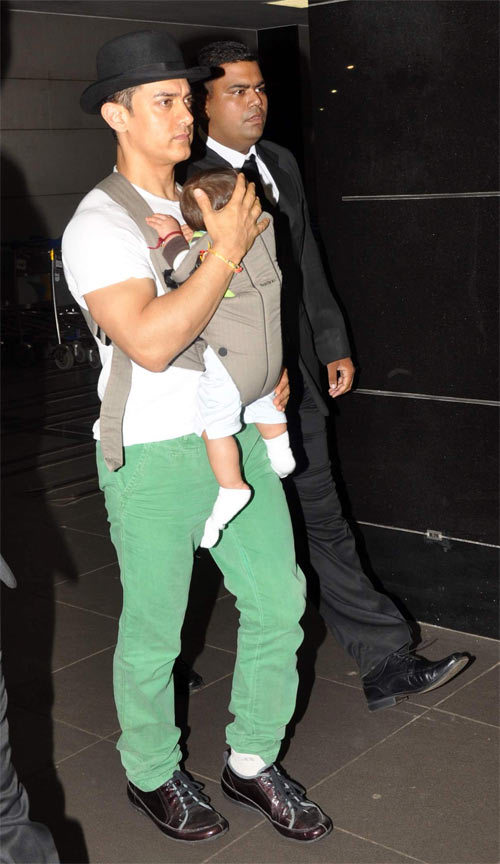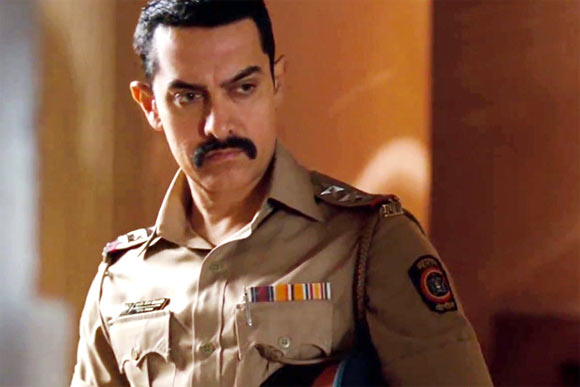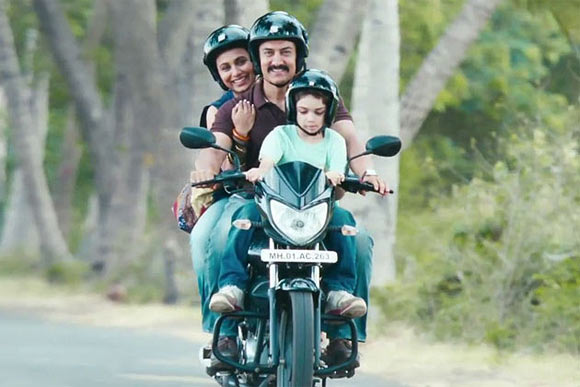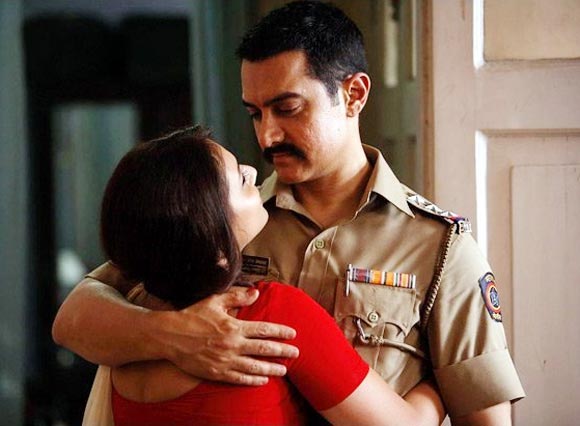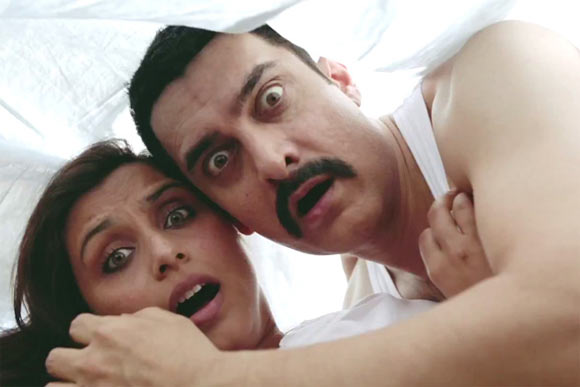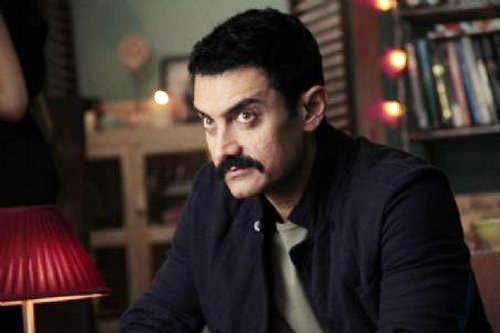 | « Back to article | Print this article |
Aamir: I don't think I am a perfectionist
Aamir Khan has a lot on his plate.
His thriller Talaash releases next Friday, November 30. Then, the actor is busy with the shoot of Dhoom 3, to be followed by Rajkumar Hirani's Peekay. And then of course, the second season of his popular television show Satyamev Jayatey.
But what really keeps him blissfully occupied is his son Azad, who will turn one next month.
In this interview with Sonil Dedhia, Aamir talks about his little baby, Talaash, and explains why he isn't a perfectionist.
How are you enjoying fatherhood?
My work doesn't allow me to spend a lot of time with Azad so I wouldn't call myself a hands-on father. I do change diapers but that's happened very rarely (smiles).
I like spending time with him. He is a real joy and is a good-natured kid.
Kiran is a hands-on mother. She is enjoying motherhood and currently, that is what she wants to do. Once in a while I do try and give her a break but she brushes it aside.
Azad will turn one in December. What plans to celebrate his birthday?
We plan to be at home with him and (invite) close family people.
Do you consult your wife for your scripts?
No. I do ask for her opinion when I am not sure. Otherwise, I like to keep the scripts as a surprise. She likes it that way too. When she watches the first cut, she is like a fresh audience, as she doesn't know what the film is all about.
'There is nothing wrong in booking theatres in advance'
Recently, Ajay Devgn was forced to take legal recourse against Yash Raj Films, producers of Jab Tak Hai Jaan, for unfairly using their dominant position in the industry to manipulate exhibitors and distributors to release their film in more theatres than Son Of Sardaar. What is your take on this?
If a producer has planned his release well in advance and has come to some agreement with the theatre owners, there is nothing wrong in booking the theatres. If my judgement tells me that I need two weeks for a film and if the theatre gives it to me, there is nothing wrong. I am not commenting on any one film, I am talking in general. As a producer, it is my right to book the theatre and my stance will remain the same.
There were reports that your film Talaash has blocked the theatre for two weeks leaving limited screens for Akshay Kumar's Khiladi 786, which releases a week after your film.
I hope we have booked for two weeks. I have no idea which film is coming before or after us. I want to make sure all those who want to see my film will get to see it.
The theatre is not bound to give me two weeks. They might decide to give me one week or to not even screen my film. This is what open market is all about. Both sides have to agree on terms.
I know of cases when the producers are so confident of their film that they want an open run. An open run is that the producer will release his film in a theatre and the theatre will not take it off until the producer says so. So if the business becomes less, the producer will give a minimum guarantee. So the terms are different for different films at different times.
'I have never looked at box office numbers'
Your films always have a right balance between content and collections. Does it become difficult to do it again and again?
Filmmaking is tough so whether you have the balance or not, you have to toil anyway.
I am fortunate that my films have been doing well at the box office and people like them. I am happy that the right kind of projects came my way.
I have worked with some really talented writers and directors, as a result of which these films have turned out the way they have.
At the end of the day, filmmaking is a team effort. The director and writer play important parts but along with that there is the cameraman, the sound engineer, the song composer, lyric writer, actors. When a film does well, it is a result of the hard work of a team of people.
Your film Ghajini started the trend of Rs 100 crores. Do you keep a tab on box office collections?
I have never looked at box office numbers. I look at them in retrospect as it helps me gauge on how well a film of mine has been received at the box office. It is one of the yardsticks that help me understand how my film has fared and how people have reacted to it.
It doesn't become a criterion for choosing films. If I had numbers in my mind, I would have never made films like Lagaan, Taare Zameen Par, Delhi Belly, Rang De Basanti or Dhobi Ghat.
Box office numbers can be deceptive because a film might have done a good business but seven out of ten people would have not liked the film. A large number of people might see the film just because a star is there.
To me, success means that when the creative team sits together to watch the film before it releases, and questions whether they have succeeded in making what they had set out to. If the team feels they have come close to that, it's the first sign of success.
How do you react to the tag of being a perfectionist?
I don't think I am a perfectionist and I don't think anyone can be a perfectionist. I enjoy my work and therefore I do it with a lot of love and care. I don't leave any stone unturned to achieve the potential of the film. But I don't think that makes me perfect. It is all about the vision of the director.
'I don't think I have ever done a film where I haven't given my opinion'
How was the experience of working with Reema Kagti?
It's been wonderful working with Reema (Kagti). She is a surefooted director. She is in control of the material and confident about what she wants. She is very clear about how she will get it. She doesn't compromise and gets what she wants.
Also, because she was the writer as well, she was very familiar with the material. I felt comfortable and safe in her hands. She could point out layers in my character and scenes that I had not thought about.
There were reports that you had creative differences with Reema, which delayed the film's release.
These rumours are not true. I was satisfied with her ideas 99 percent of the time.
I don't think I have ever done a film where I haven't given my opinion. Sometimes it is taken and sometimes it is not. But I trust my directors. When a director is working, everyone gives his or her opinions. When I was working on Taare Zameen Par, everyone gave me suggestions. This didn't make me less of a director. It is up to me to take them or not.
You have had fallouts with directors like Anusha Rizvi (director of Peepli Live) and Amol Gupte (creative director of Taare Zameen Par) in the past as well.
Like I said, these rumours aren't true.
I remember during Lagaan also there was something about me not being happy with the film and re-shooting the second half. if I go around clarifying every rumour, I will have to stop working. In fact, people will start thinking that I am clarifying every rumour so lets create some more! (Laughs)
I did have creative differences with Amol and that resulted in us parting ways. He was directing the film first.
'I am not satisfied with all the films that I have done'
You will soon complete 25 years in this industry. What are the changes that you have seen?
A major change is that earlier producers and directors weren't so keen about experimenting with scripts. Now, that is not there. Different types of films are being made.
I always tried to make new kinds of films. When Qayamat Se Qayamat Tak came, it was different for that time. No one wanted to release that film. Action was the trend back then, so films like Dil Hai Ki Manta Nahi, Andaz Apna Apna and Jo Jeeta Wohi Sikander were very different. Andaz Apna Apna wasn't even successful at that time.
Do you still get nervous before a film's release?
Yes. I just want to run for cover.
Sometimes, I feel we have made a good film and people will love it and sometimes I feel they won't. It's like being in love. Sometime you feel she loves me and sometimes you feel she didn't think of me at all. It's like a date with your girlfriend. We all hope that we will not be stood up on Friday.
Looking back, do you feel satisfied with all the films that you have done?
No. Filmmaking is a difficult process. When you set out to make a film, you are hopeful and then by the end of it, you feel you have gone wrong. This has happened to me in the early part of my career. It can be disappointing.
But I like to be realistic. I am very brutally honest to myself so in hindsight when I look at my films, there are many, which I am embarrassed to show. I don't want to name them as each film has emotions and people attached to it, and I don't want to hurt anyone. I value my failures as much as my success. I may not be proud of them but I value them perhaps more than my successes, as those were the times I got to learn. It is my failures that have brought me here today. The fact that I was ashamed of them provoked me to working in a different way.
'I think villains have moved out of our scenarios'
You are playing a villain in Dhoom 3. How have you been training for it?
I have been training for a year and a half for Dhoom 3. I am playing a gymnast so I require a low body fat percentage. I have been working towards having a lean and muscular body. A lot of attention has been given to the look of the film as well.
Do you think the concept of villains have died down in Hindi films?
I think villains have moved out of our scenarios. We don't have villains anymore in our scripts by and large. It's more of a social thing. At one time, our society had a clear moral view. So those people were the villains in our stories too. There was a phase when mill owners were shown as villains. The smugglers later came, and then the underworld and the politicians. So society looked upon a certain section and said that we don't like these people.
Today, we don't have such strong moral concepts. Being clever and opportunist is not a bad thing anymore. We don't have black and white views on moralities.
'My dream project is to make Mahabharata'
Any plans to direct a film?
I have a story which I have chosen to direct but I don't know when it will happen. As of now, I have so much responsibility. Talaash releases next week. I am shooting for Dhoom 3 and early next year, I will start shooting for Rajkumar Hirani's Peekay. I am also working on Satyamave Jayate season 2.
You had shown a keen interest in making Mahabharata.
Yes. It's my dream project but if I decide to make it, I will have to give 20 years of my life. A minimum five years will go only in doing the research of the film. The material is very exciting but it scares me.
